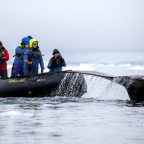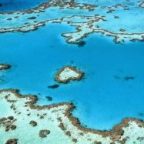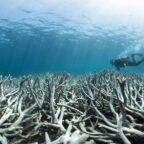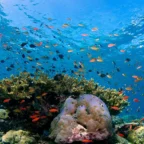
Scientists will not know for months how much damage the Indian Ocean tsunami caused to coral reefs, a crucial barrier against heavy seas and valuable tourist attraction, a reef conservation group said on Wednesday.
The Dec. 26 wave that killed at least 156,000 also devastated coastlines, damaging reefs that are a draw to snorkelers and divers, and a source of food and livelihood for many coastal communities.
“Scientists around the world are currently trying to collect data to get an idea of the amount of damage caused to reefs and we think that it will take at least two months before a general assessment is made,” Kristian Teleki, managing director of the International Coral Reef Action Network, told Reuters in an interview.
Teleki said reefs may have broken in areas close to the undersea quake’s epicentre, but said the more likely causes of damage were pollution and deadly bleaching by the sun as coastal waters were sucked far out to sea during the tsunami.
“We already know that a massive amount of debris has been caught up in the reefs, having been swept up from the land by the rushing wall of water,” said Teleki.
Decomposing bodies, rubble and trees are just some of the things caught in the reefs, he said.
“It will take a massive international effort to remove this,” he said, speaking on the sidelines of a United Nations conference on small island problems.
TAKE MORE CARE OF REEFS
One challenge is protecting the health and natural beauty of the fragile reefs, which can easily be damaged or destroyed.
Coastal land development, careless tourism practices, over-fishing and rising water temperatures through climate change are the biggest threats, environmentalists say.
According to the Global Coral Reef Monitoring Network, 20 percent of the world’s coral reefs have been destroyed and show no prospect of recovery.
Many poor coastal communities struggle to balance the need for tourism money with conservation.
The World Wildlife Fund estimates reefs provide $30 billion annually in goods and services worldwide. Besides generating tourism jobs, the fish-rich reefs also bring food and jobs to coastal residents.
But the tsunami has also highlighted the fact that reefs, along with coastal mangroves, serve as strong barriers against an angry sea. Some scientists believe they offer more protection from waves than man-made barriers.
That should persuade more governments to take more care of reefs, Teleki said.
“Of course, coral reefs will not stop a tsunami but if they are protected and healthy, they can certainly lessen the impact of a tsunami as they absorb the force of energy of the wave,” he said.
Source: Reuters












Social Profiles